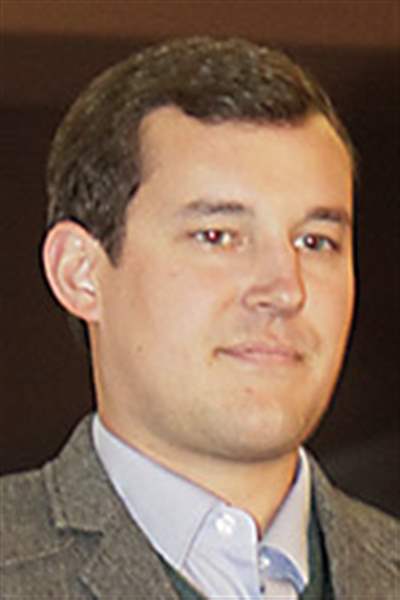
Treece’s plan lacks recipe, officials say
Scant details from Toledo Express airport suitor raise concern.
11/30/2013
Dock David Treece
THE BLADE
Buy This Image

From left are the primary Treeces who want to take over the airport: Dock David Treece, Dock Treece, and Benjamin Treece.

Dock David Treece
Updated on Wednesday, Dec. 4, 2013 at 7:13 p.m. to reflect the following change: The first name of Sylvania Township businessman Dock Treece's father was misspelled. It was Ottie.

Dock Treece
A favorite activity of Dock Treece’s father in his later years was to hold molasses “stir-offs” on the old family farm in backwoods Tennessee, where sugar cane and sorghum were cooked down over an open fire to make molasses.
The younger Mr. Treece says he never helped make molasses because he had left to make his fortune up north, first in a Detroit auto factory and then in Toledo selling securities.
But after he became successful, his sons were able to go back and buy the farm, which they now list among the family’s varied business interests.
Mr. Treece, 63, now wants to buy another operation: Not one making molasses, but one mixing his family’s business skills with the business potential of a prized local public asset that recently has fallen on hard times — Toledo Express Airport.
But it’s going to take more than a recipe and a long spoon to run an airport.
As Mr. Treece and his sons continue to publicly promote their idea to run the airport without turning over detailed plans, and make some misleading statements along the way, local officials are becoming frustrated.
Mr. Treece said he and his wife and sons are stepping up to put their own fortune at risk to make the city-owned airport a success.
“My intent is to find aviation-related industries that we can bring here. If we can’t do that, the city will get the property back and we’ll be out of a ton of money,” Mr. Treece said recently. “I’m not looking at it as a charity business. If I’m not successful, I lose money.
“This airport deal is an opportunity for me to take an underutilized public asset, turn it into a more widely utilized asset that produces jobs, and make money for me and my sons,” he said. “There is nobody [who’s] going to give the city the deal we’ve offered. We’ve done our due diligence. We know how much business is out there to be done and nobody else does,” Mr. Treece said.
He said other private operators would want to be paid by the city to run the airport and would shift any deficit back to the city. “We’re the only ones at the table with money and willing to pick up the risk,” Mr. Treece said.
What’s at stake
The question — still unanswered — is what would Toledo Express Airport, as well as Toledo Executive Airport, lose in order to justify so much risk on the part of the Treeces, who have no experience operating an airport.
The businesses that could be recruited include defense contractors, scheduled charter operators, airline maintenance operations, airplane refurbishing companies, pilot training services, and a number of ancillary logistics companies, according to son Dock David Treece.
Dock Treece, along with his wife, Cynthia, and sons Dock David, 26, and Benjamin, 25, months ago began circulating their idea to take over complete management of the airport, with the option to lease and buy property related to the airport from the city.
They held a series of secret meetings with members of the Toledo-Lucas County Port Authority and the administration of Mayor Mike Bell, while deliberately leaving Toledo City Council out of the loop for the time being.
Last week, they took the additional step of creating a Web site, www.toledoairports.com, which provides some detail about their business, Toledo Airport Operations Co. and Toledo Airport Facilities Co., but little fresh insight into how their proposal would be more successful than the port authority has been in the 40 years it has leased the two airports, or how they would preserve and enhance the airport rather than strip it of property that has been gradually built up over six decades.
The site responds briefly to some questions that have been publicly raised, and identifies eight businesses the Treeces control, including the investment advisory business, a farm, a business relocation firm, a real estate management company, a staffing company, and an aircraft leasing business that has owned 13 aircraft.
But rather than spell out their plans for Toledo Express, the Treeces withheld key documents — a feasibility study and business plan — while at the same time claiming they have withheld nothing from Toledo City Council or the public.
Jerry Chabler, chairman of the port’s airport committee, said port officials held three or four meetings with Mr. Treece.
“We’ve been asking for a plan since the first day we met with him, and he never submitted one,” said Mr. Chabler, who earlier this week told The Blade that Mr. Treece had no qualifications to operate an airport.
“He bases his ability to operate an airport on the fact that he’s been a longtime pilot of airplanes. It takes a heckuva lot more to run an airport,” Mr. Chabler said.
Mayor-elect D. Michael Collins said he is willing to look at the proposal when he gets more details.
Paul Toth, president of the Toledo-Lucas County Port Authority, two weeks ago told Mr. Treece to direct his communications regarding the airport to the mayor and council.
180th’s future
Mr. Treece raised the hackles of both the Toledo Regional Chamber of Commerce and the 180th Fighter Wing of the Ohio Air National Guard by warning of a potential round of base closings by the Pentagon that could threaten the military base at Toledo Express Airport.
“There is no BRAC [base realignment and closure] round scheduled for 2015,” said Wendy Gramza, executive vice president of the chamber. Ryan Walker, chief of staff for U.S. Rep. Bob Latta (R., Bowling Green), whose district includes the two airports, said the Obama Administration for the last two years has asked Congress to schedule another BRAC process, but the military committees of both houses of Congress have refused to do so.
Ms. Gramza said the chamber has no position on the Treece proposal, but that talk about changing the ownership of the airport unnecessarily sends a message of “instability” to the Pentagon.
Mr. Treece’s proposal, while technically an agreement for an option to buy the airport, would never result in that happening because of the high cost associated with repaying the Federal Aviation Administration for all grants and loans it has provided, an amount estimated by Mr. Treece at $80 million.
Mr. Treece also has suggested the 180th’s future is in doubt because of the rise of unmanned drones.
But Maj. Gary Bentley, a spokesman for the 180th, said the military has a long-term commitment to manned fighters and there is no threat on the horizon of the 180th being dismantled. He said the 180th expects to participate in the addition of a new manned fighter, the F-35 Joint Strike Fighter, that will be used by all branches of the military.
“That is absolutely a future plan. There is no question that manned fighter aircraft are in the works for years to come,” Major Bentley said.
Mr. Treece said he would execute a lease-purchase agreement with the city of Toledo, which owns the airport and currently leases it to the port authority. He would hire an aviation manager to operate the airport, at a cost of $400,000 to $500,000 a year, and then would seek to develop through sales and leases the land at and around the airport, as well as outside the airport’s and port authority’s boundaries.
The plan emerges at a time when aviation in Toledo is struggling. Both passenger service and air freight handling are at unusually low levels at Toledo Express. The port authority has lost more than $500,000 over the last two years and expects to lose at least another $300,000 this year — all of which is subsidized by the port’s other operations.
Mr. Treece contends that only someone with money on the line is going to be able to devote the effort needed to turn a profit at the airport.
Self-made success
A self-made man, Mr. Treece, 63, was raised in poverty, in rural Claiborne County, Tennessee, by his grandmother after his parents divorced and left him when he was 3. His father moved to Detroit and started a new family. His mother remarried and moved to Indiana.
“My grandfather was a Baptist minister. My grandmother loved me as much as a mother could,” Mr. Treece said. Neither his home nor his elementary school had indoor toilets.
A distant relative of Mr. Treece, Donna Treece Lewis, coordinator of adult education for the Claiborne County Board of Education, said she knew Mr. Treece’s father as one of the area Treeces who had moved to Monroe County, Michigan, for work. She said that he later returned to the family farm where he grew sugar cane and made molasses.
“Ottie, his dad, was raised just out the road from where I was raised. We used to go out the road to their farm and have a molasses stir-off,” Ms. Lewis said. “Over an open fire pit you have this big long thing that looks like a shallow coffin and you heat that sorghum up until it thickens and becomes molasses.”
Dock Treece said his father and his father’s brother had a molasses mill on the old farm.
“I don’t know anything about it, other than I’ve been there a couple of years ago,” Mr. Treece said.
He graduated from high school in 1968 and moved to Michigan, taking a summer job at Ford’s Woodhaven plant.
“I was making more money than anyone in my family, including my father, had ever made,” Mr. Treece said. In 1972, he completed a technical program in machine repair sponsored by the Ford Motor Co. at Henry Ford Community College, a two-year college in Dearborn.
One of his last jobs with Ford was to help get the machines up and running at Ford’s new plant in Maumee, which closed several years ago.
In 1977, he started his first company, a business relocation firm, and was introduced to the securities business in 1979.
According to the Ohio Department of Commerce, Mr. Treece in 1985 bought out a firm based in Youngstown and gave it the name it has now, which is Treece Investment Advisory Corp. He is also licensed in Florida and Michigan. The commerce department record shows Mr. Treece has had no customer complaints, regulatory actions, employment terminations, bankruptcy filings, or criminal or civil judicial proceedings relating to his business.
He served one term on the Sylvania Board of Education, 1993-97, and one term on the Sylvania Township Board of Trustees, but was defeated for re-election in 2001.
Airport’s decline
Mr. Treece’s interest in the airport occurs at a time when it is failing to even pay its own bills, and discussion of seeking a new model of airport management is growing.
The airport opened in 1955 and struggled to live up to expectations that it be the gateway to tourism and economic development in Lucas County. Two decades ago, the future started looking bright. Burlington Air Express had set up operations and was running nightly cargo flights that were so frequent and heavily laden, the port authority had to buy out residences because of the deafening jet noise.
Paul Mifsud, chief of staff to then-Gov. George Voinovich, urged the community in 1994 to avoid cluttering the airport with haphazard development that would choke the facility, and advocated the airport expand and construct a second parallel runway to take advantage of “a major opportunity” for business development.
In 1996, Toledo Express Airport was among the top 20 airports in the country for handling air cargo volume. That same year, the Lucas County commissioners appointed a committee on airport zoning, the goal of which was to create a special airport zoning district to ensure that “residences, shops, and restaurants don’t choke the airport’s future,” as The Blade reported on April 26, 1996.
But that plan wilted as Monclova and Springfield township officials objected to having their zoning authority encroached on.
The air cargo business peaked in 1998 with just under 600,000 tons of cargo shipped, and Burlington successor BAX Global closed in 2012, eliminating 700 jobs. It wasn’t just Toledo that lost cargo operations. In 2009, DHL shut down a massive cargo hub and distribution center in Wilmington, Ohio, that had employed 7,000 people. And Dayton lost an Emery air freight operation in 2003.
Mr. Toth said passenger service also dropped at Toledo Express, not only because of the city’s proximity to Detroit Metropolitan Airport, only half an hour further away from downtown Toledo than to Toledo Express, but because of the high cost of jet fuel, which cost a little over 50 cents a gallon in 1994, rising to $3 a gallon in 2012. Passenger service peaked around 1997 with just under 350,000 passengers, and was down to about 70,000 passengers in 2012. Toledo Express now has two passenger airlines — Allegiant, which flies to Florida, and American Airlines, which flies to Chicago.
According to Mr. Toth, the airport earned total profits of $14.6 million from 2001 to 2010 — evidence, he said, of the port’s ability to run the airport profitably.
He acknowledged that the city and the port authority own a lot of development-ready land around the airport.
“There’s surplus property all over the place out there. That doesn’t mean there’s any demand for it,” Mr. Toth said.
He also said the port authority is open to selling and leasing property.
“Nobody that really understands airports, especially in secondary markets like Toledo, would have an interest in doing that [taking over management of the airport]. They’re not money-making entities,” he said.
The airport consists of 2,596 acres, of which 1,210 were acquired for noise reduction. Mr. Toth said the port authority has sold approximately 62 acres for redevelopment purposes since 2009. It has 250 developable acres on the south side of the airport where it has invested more than $2 million to extend water, sewer, gas, and electric service, and has built part of a road and an 80,000-square-foot industrial building with developer Ed Harmon that has been leased.
In any case, plans to sell off airport property might have to be squared with the official policy of the master transportation plan.
The most current plan, kept updated by the Toledo Metropolitan Council of Governments, sets a priority on keeping the airport open. The Toledo Regional Transportation Coalition has asked state and federal lawmakers to “secure funding to reserve property and plan for further expansion of the capacity of the airport to cope with anticipated freight activity growth.”
Contact Tom Troy: tomtroy@theblade.com or 419--724-6058 or an Twitter @TomFTroy.